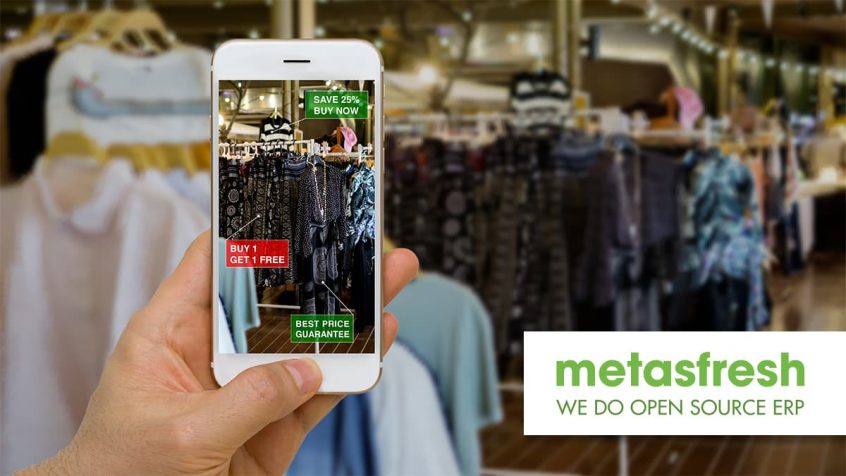Share this Post
We are now entering a new era — the post-digital era. This was the ultimate conclusion of Accenture’s annual Technology Vision 2019 survey of more than 6,600 business and IT executives, and reaffirmed in its Technology Vision 2020 report. But, what does that mean, and how will it impact your retail business?
Well, first — “post-digital” certainly doesn’t mean that digital is over. Indeed, digital is more important for both consumers and retailers now than it has ever been. Rather, Accenture posits the term as a means to define the new reality we now face and have come to accept. Digital technology is no longer a valuable addition to a business, a nice-to-have — it is a core element of remaining viable, a must-have.
In fact, according to the 2019 survey, 79% of executives believed technologies such as mobile, analytics, social platforms and cloud are now essential elements of their business. In other words, organisations are no longer exploring emerging technologies, but are implementing them as standard.
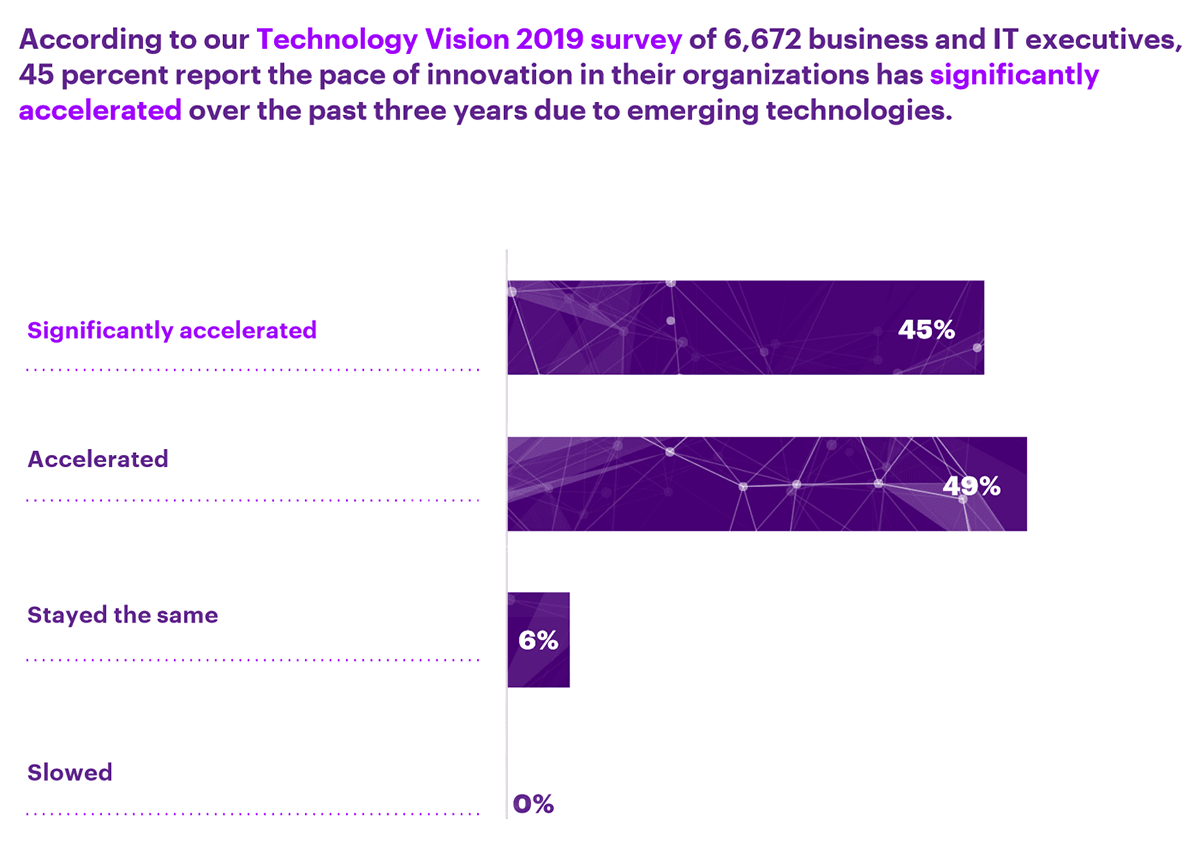
The pace of innovation in organizations has significantly accelerated —Source: accenture.com
From the consumer perspective, technology is increasingly becoming an inextricable part of the human experience. More than half the world’s population — 4.5 billion people — have access to the internet, according to Technology Vision 2020. People are connected on every type of device — be it their mobiles, their computers, their cars, refrigerators, or apps in the classroom — globally spending an average of 6.4 hours online daily. As such, 52% say that digital technology is ingrained into almost every aspect of their day-to-day lives, with one in five (19%) saying that they even view it as an extension of themselves.
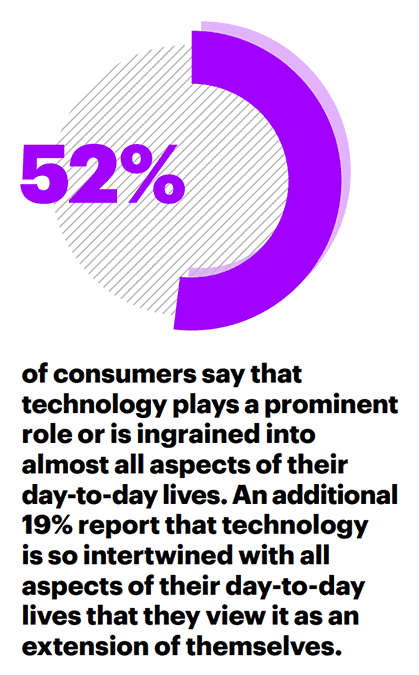
Technology plays a prominent role —Source: accenture.com
Combined, given the collective prioritisation of digital technology by businesses and the universal embrace of it by consumers, digital-era technology, which began as a differentiating advantage, is now something that is simply expected from every business. This is the post-digital era.
The question for retailers, then, as the digital playing field levels out and all companies are digital by default, becomes — where will your competitive edge come from?
As Paul Daugherty, Group Chief Executive and CTO at Accenture puts it, “A post-digital world doesn’t mean that digital is over. On the contrary, we’re posing a new question: as all organisations develop their digital competency, what will set YOU apart?”
Building Interactive, Cooperative Experiences
To meet digitally mature expectations, retailers will need to deliver not just personalised experiences, but one-of-a-kind, individualised experiences to customers. Accenture calls this putting the “I in experience” — a trend that is being driven not only in retail, but across all industries and verticals. Take Netflix’s Black Mirror: Bandersnatch, for instance. Netflix has always been a trailblazer in personalising the user experience for customers with tailored recommendations and email campaigns. But with Bandersnatch, the video streaming service created a show where individual viewers can tailor the action for themselves. Bandersnatch is in fact an interactive choose-your-own-adventure film, in which viewers make decisions for the main character, such as which song to listen to or whether or not to bury the body. In all, there are 150 minutes of unique footage divided into 250 segments — resulting in over one trillion possible paths the viewer can take to get to five possible endings. YouTube, Amazon Audible, and the BBC have all created similar interactive content to deliver completely individualised experiences for audiences, whereby the individual is an active and necessary contributor to that experience.
“This may seem like an entertainment industry fad,” says Accenture, “but it reflects a growing opportunity for businesses of all kinds: building cooperative experiences. These cooperative experiences are the next generation of business offerings, where enterprises are becoming collaborative partners in experience creation, not just providers of it — ultimately transforming their relationships with customers.”
Indeed, what tomorrow’s retailers will need to account for is the fact that, when it comes to customer experience, they’re not just competing with other retailers, but all brands, businesses and services that consumers engage with. To succeed means giving customers agency (i.e. the ability to make relevant choices that inform their experiences), turning passive consumers into active participants in their journeys and ongoing relationships with your brand. In other words, it’s about becoming a true partner to your customers using the latest digital solutions.
A good example can be found in the restaurant industry with THE.FIT — a menu personalisation engine that uses AI to help restaurants collaborate with customers to customize menus for their individual dietary requirements, no matter how complex. Using an app, customers select their dietary needs and preferences and then receive an individualised menu based on those needs.
Partnering with customers in this way and letting people design their own experiences will become increasingly important differentiators for retail brands in the post-digital world.
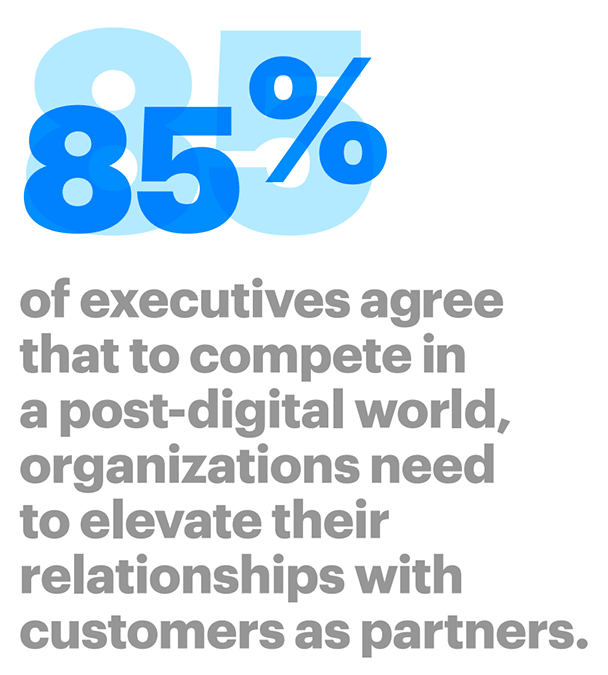
Organizations need to elevate their relationships with customers as partners —Source: accenture.com
The Retail Store of the Post-Digital Future
So, how might this all translate to retail? A 2020 report from McKinsey — Future of Retail Operations: Winning in a Digital Era — reveals how several new technologies have now reached tipping point and are set to spill over onto the retail floor — in particular machine learning, big data analytics, automation systems and the Internet of Things (IoT).
McKinsey gives a hypothetical example of a customer journeying through the “retail store of the future.” Entering a grocery retailer, the store recognises him and his smartphone pings into life. The store accesses his shopping list, and, as he walks the aisles, smart shelf displays illuminate to show him the location of the items on his list — while also highlighting personalised offers or recommendations not on the list. As he picks items, he scans them with his phone, and an augmented reality (AR) display reveals nutritional, origin and sustainability information. When he’s bagged everything he needs, he simply walks out of the store. No need to wait at the checkout — RFID scanners and machine-vision systems have clocked all his items, and his credit card is automatically charged.
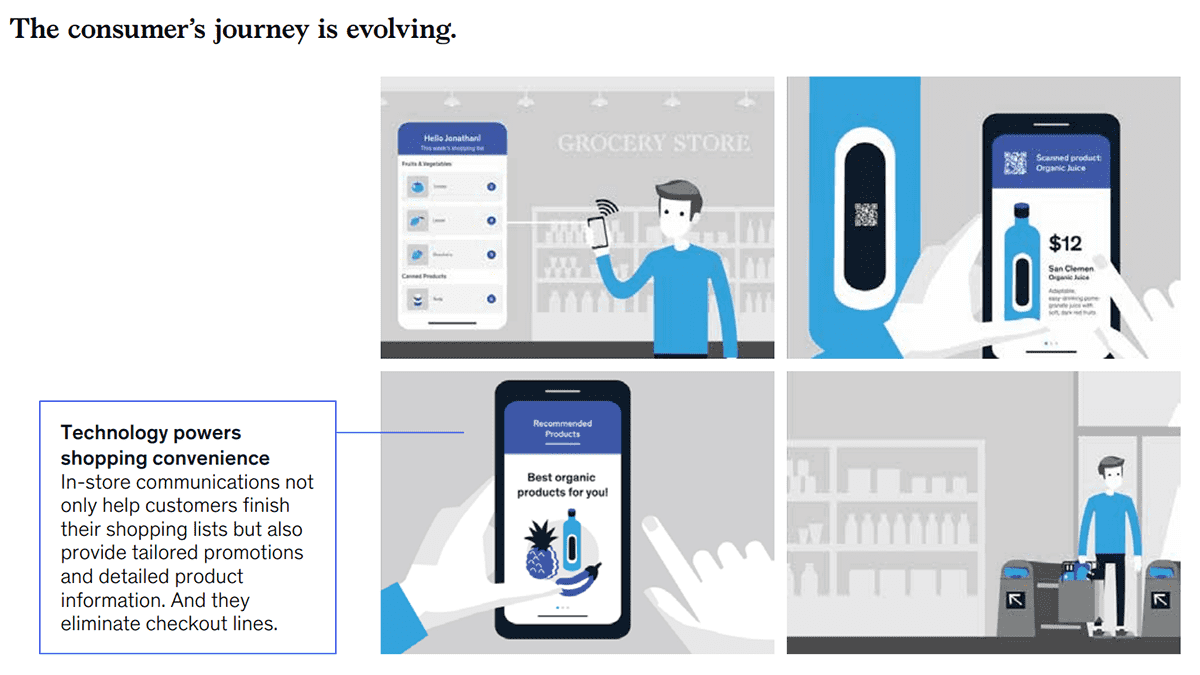
The evolving consumer journey —Source: mckinsey.com
Such technologies will transform store associate and manager journeys, too. Smart shelves, of course, monitor inventory status, while machine learning systems plan and automate replenishments — so store associates, armed with handheld devices replete with detailed customer information, can spend more of their time helping and interacting with customers. If an item isn’t available on the shelves, for instance, the associate can pinpoint its location and real-time stock level at a glance. Meanwhile, the store manager is using AI-powered associate scheduling tools to ensure all shifts are covered, and testing variants of a new promotion using an interactive digital twin of the store.
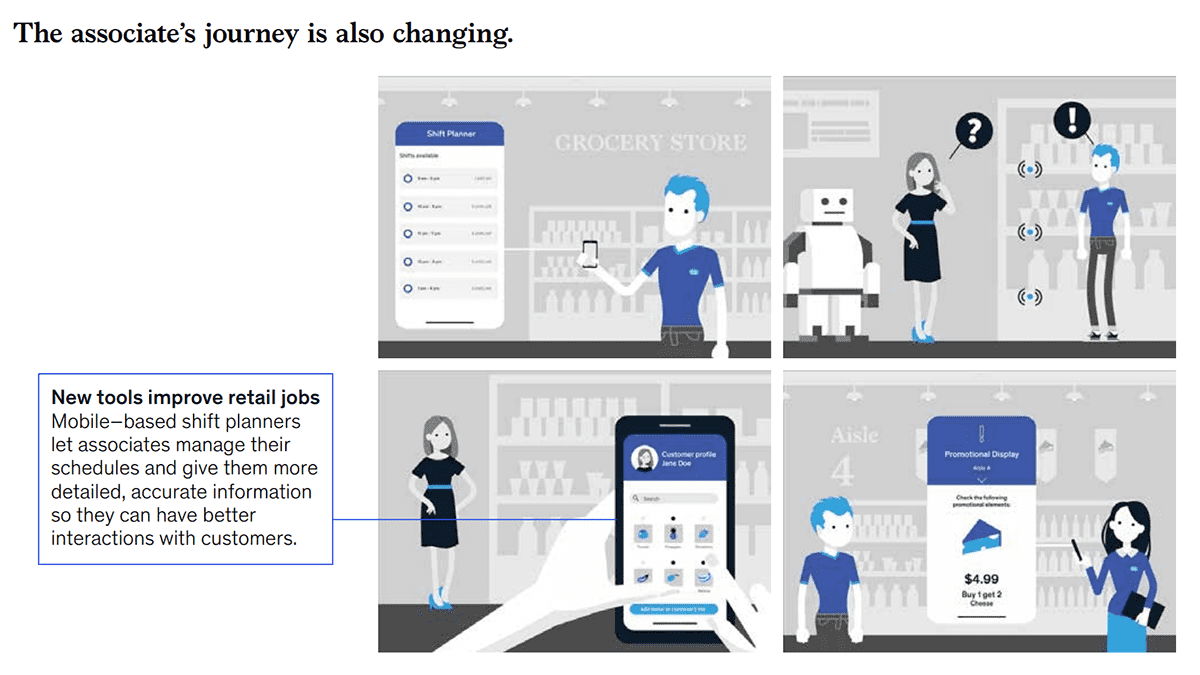
The evolving associate and manager journeys —Source: mckinsey.com
Embracing such in-store technology and all the employee and customer experience benefits it offers will have a positive impact on the store’s profit and loss (P&L) sheet, McKinsey’s research suggests. “While our example has been taken from grocery retail, this impact will be noticeable across the sector. Personalized offerings and optimized assortments will likely raise sales and cut waste, while opportunities to upsell and cross-sell, either automatically or in person, can increase basket sizes and conversion rates.”
The profile of the workforce will inevitably change, too, says McKinsey — skilled and knowledgeable associates can expect to earn about 20% more, though total wages will likely fall, as automation and technology take over. In all, McKinsey estimates that the store of the post-digital future will achieve earnings before interest and tax (EBIT) margins twice those of the today, with additional benefits of improved customer experience, better employee engagement, and an easier-to-run store.
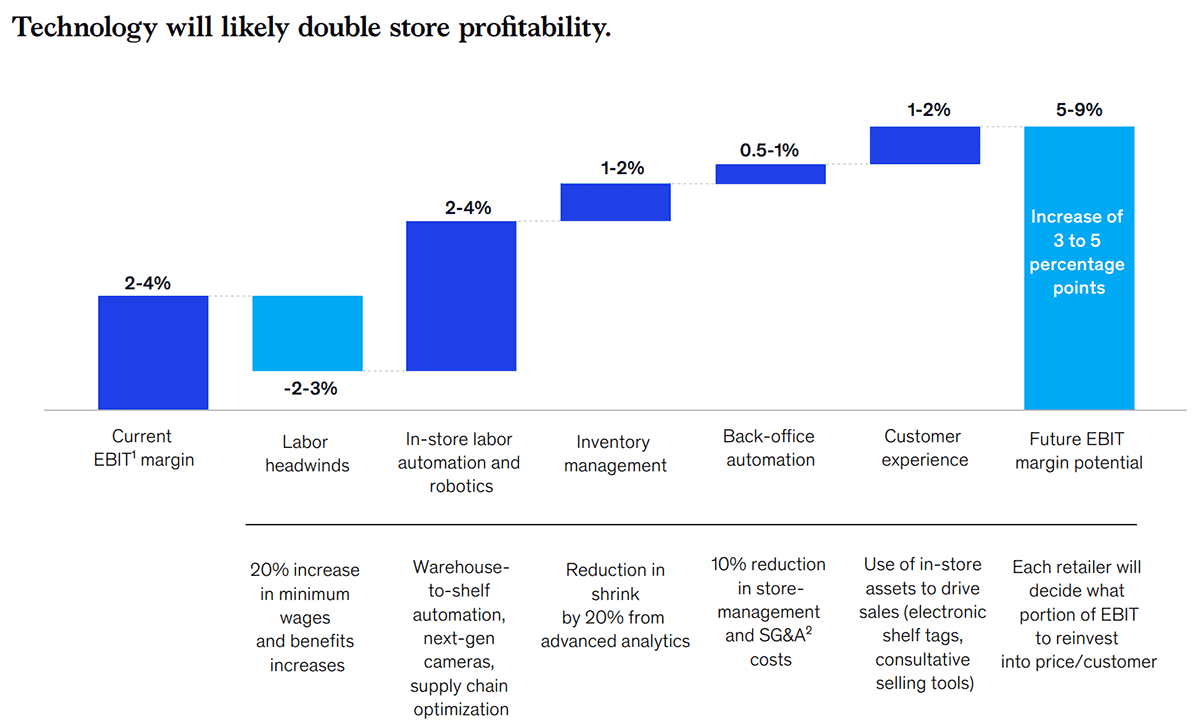
The financial impact of in-store technology —Source: mckinsey.com
Final Thoughts
Though the post-digital store of the future may still be in its infancy, it’s important to note that every single one of the technologies McKinsey describes in its example already exist today as commercially available products. In time, more and more stores will embrace and implement them, meaning all retailer leaders need to prepare their organisations for the next wave of technology-enabled customer experience and in-store efficiency.
Importantly, in order to be successful, all such technologies will require robust integration with a centralised business management system such as metasfresh ERP. A key aspect of metasfresh is that it serves as a centralised, single source of truth for all business data. This includes inventory information, HR information, pricing information, product data, category data, customer data and order data.
This data — and an overarching system that centralises it — is crucial for the successful implementation of any next-generation in-store technology to ensure that all systems work together cohesively and that superlative, data-driven, individualised customer experiences can be executed effectively.
Talk to us here at metasfresh about your post-digital retail strategy. metasfresh is a member of the Ecommerce and Cross-Channel Club Cologne (ECC Club Köln), which is managed by the Institute for Retail Research Cologne (Institut für Handelsforschung, IFH Köln). The Institute offers individual research projects with strategic consulting. It specialises in the areas of inter-company comparisons as a controlling instrument, enabling retail companies to recognise market developments, measure changes in customer behaviour, optimise sales and set the course for a successful future. The insights and knowledge provided by the Institute through market research and studies relating to cross-channel and online retail are incorporated in the development of metasfresh, meaning all of our users are always up to date on the latest ecommerce developments.
At metasfresh, our mission is to enable each and every company to access a powerful ERP system that supports digital transformation and fuels corporate growth. Get in touch today for more information and insights.
Share this Post



